Ethical Decision Making and Effective Management: An Overview
VerifiedAdded on 2021/06/14
|14
|4904
|35
Essay
AI Summary
This essay provides a comprehensive analysis of ethical decision-making and its crucial role in effective management. It begins by introducing the significance of ethics in organizational settings, emphasizing the importance of ethical decisions for legal compliance, stakeholder well-being, and community impact. The essay then delves into a literature review, examining the relationship between ethical decision-making and effective management, highlighting the influence of ethical and moral beliefs on managerial actions. It explores various ethical decision-making approaches, including utilitarian, virtue, and fairness and justice approaches. Furthermore, the essay discusses the role of managers in ethical decision-making, emphasizing their responsibilities in upholding ethical standards and guiding employees. It also examines the skills and capabilities essential for making sound ethical decisions, such as intuition, reasoning, and communication. The essay concludes by discussing the relationship between personality traits and ethical decision-making, highlighting how individual characteristics influence ethical choices. The author also includes a self-evaluation using the Big Five Personality Test, emotional intelligence test as stress management indicator tool to assess their managerial traits and identify areas for improvement.
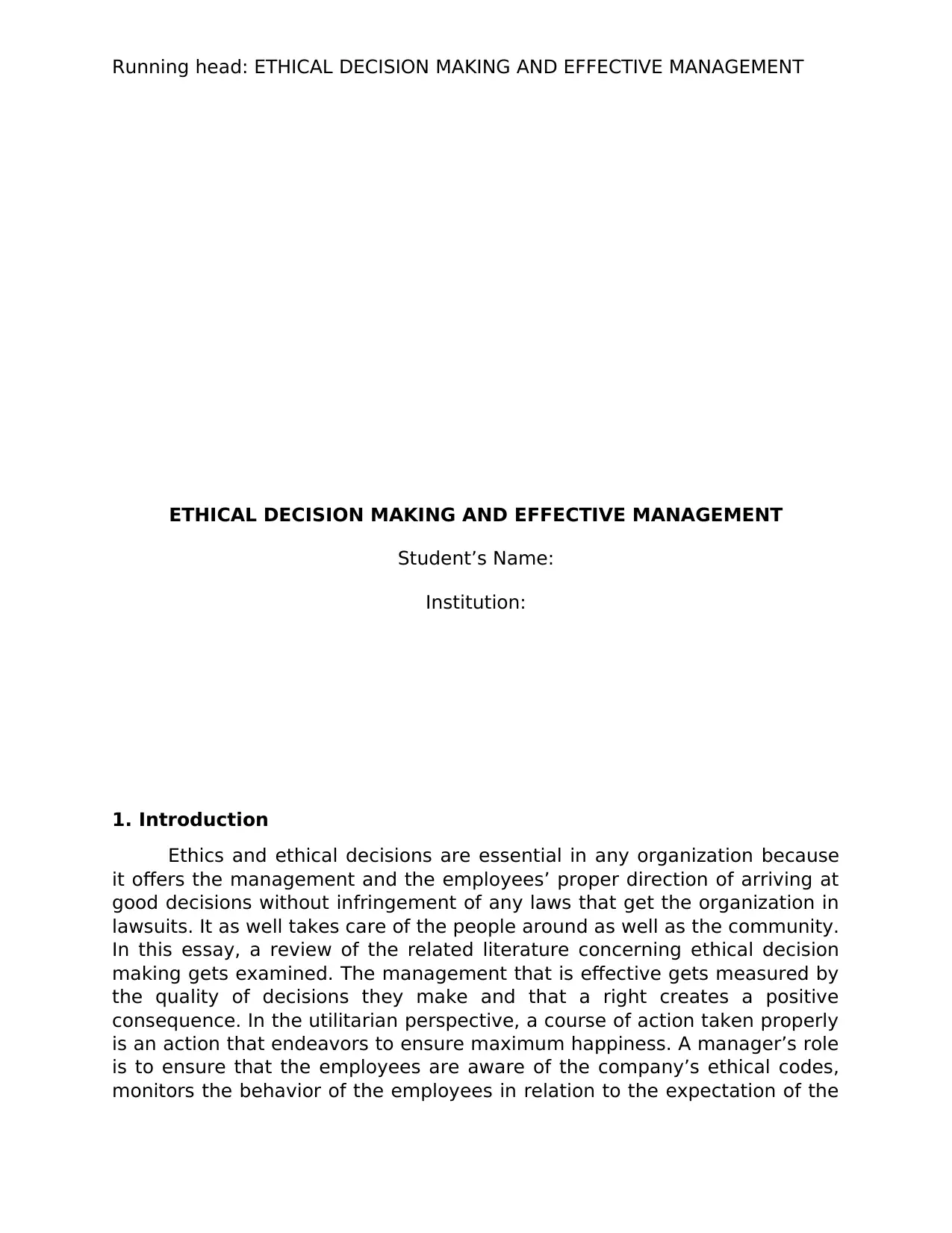
Running head: ETHICAL DECISION MAKING AND EFFECTIVE MANAGEMENT
ETHICAL DECISION MAKING AND EFFECTIVE MANAGEMENT
Student’s Name:
Institution:
1. Introduction
Ethics and ethical decisions are essential in any organization because
it offers the management and the employees’ proper direction of arriving at
good decisions without infringement of any laws that get the organization in
lawsuits. It as well takes care of the people around as well as the community.
In this essay, a review of the related literature concerning ethical decision
making gets examined. The management that is effective gets measured by
the quality of decisions they make and that a right creates a positive
consequence. In the utilitarian perspective, a course of action taken properly
is an action that endeavors to ensure maximum happiness. A manager’s role
is to ensure that the employees are aware of the company’s ethical codes,
monitors the behavior of the employees in relation to the expectation of the
ETHICAL DECISION MAKING AND EFFECTIVE MANAGEMENT
Student’s Name:
Institution:
1. Introduction
Ethics and ethical decisions are essential in any organization because
it offers the management and the employees’ proper direction of arriving at
good decisions without infringement of any laws that get the organization in
lawsuits. It as well takes care of the people around as well as the community.
In this essay, a review of the related literature concerning ethical decision
making gets examined. The management that is effective gets measured by
the quality of decisions they make and that a right creates a positive
consequence. In the utilitarian perspective, a course of action taken properly
is an action that endeavors to ensure maximum happiness. A manager’s role
is to ensure that the employees are aware of the company’s ethical codes,
monitors the behavior of the employees in relation to the expectation of the
Paraphrase This Document
Need a fresh take? Get an instant paraphrase of this document with our AI Paraphraser
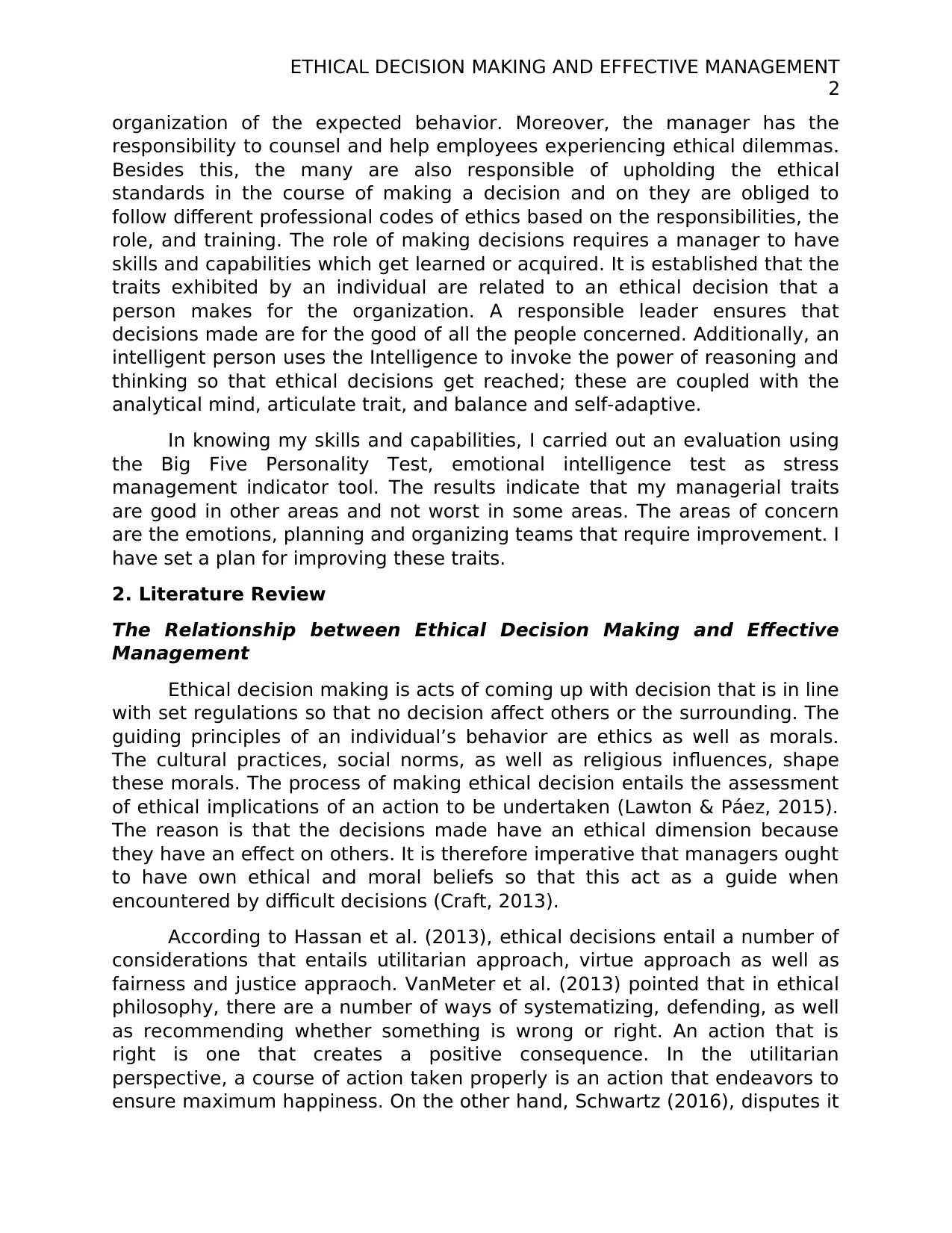
ETHICAL DECISION MAKING AND EFFECTIVE MANAGEMENT
2
organization of the expected behavior. Moreover, the manager has the
responsibility to counsel and help employees experiencing ethical dilemmas.
Besides this, the many are also responsible of upholding the ethical
standards in the course of making a decision and on they are obliged to
follow different professional codes of ethics based on the responsibilities, the
role, and training. The role of making decisions requires a manager to have
skills and capabilities which get learned or acquired. It is established that the
traits exhibited by an individual are related to an ethical decision that a
person makes for the organization. A responsible leader ensures that
decisions made are for the good of all the people concerned. Additionally, an
intelligent person uses the Intelligence to invoke the power of reasoning and
thinking so that ethical decisions get reached; these are coupled with the
analytical mind, articulate trait, and balance and self-adaptive.
In knowing my skills and capabilities, I carried out an evaluation using
the Big Five Personality Test, emotional intelligence test as stress
management indicator tool. The results indicate that my managerial traits
are good in other areas and not worst in some areas. The areas of concern
are the emotions, planning and organizing teams that require improvement. I
have set a plan for improving these traits.
2. Literature Review
The Relationship between Ethical Decision Making and Effective
Management
Ethical decision making is acts of coming up with decision that is in line
with set regulations so that no decision affect others or the surrounding. The
guiding principles of an individual’s behavior are ethics as well as morals.
The cultural practices, social norms, as well as religious influences, shape
these morals. The process of making ethical decision entails the assessment
of ethical implications of an action to be undertaken (Lawton & Páez, 2015).
The reason is that the decisions made have an ethical dimension because
they have an effect on others. It is therefore imperative that managers ought
to have own ethical and moral beliefs so that this act as a guide when
encountered by difficult decisions (Craft, 2013).
According to Hassan et al. (2013), ethical decisions entail a number of
considerations that entails utilitarian approach, virtue approach as well as
fairness and justice appraoch. VanMeter et al. (2013) pointed that in ethical
philosophy, there are a number of ways of systematizing, defending, as well
as recommending whether something is wrong or right. An action that is
right is one that creates a positive consequence. In the utilitarian
perspective, a course of action taken properly is an action that endeavors to
ensure maximum happiness. On the other hand, Schwartz (2016), disputes it
2
organization of the expected behavior. Moreover, the manager has the
responsibility to counsel and help employees experiencing ethical dilemmas.
Besides this, the many are also responsible of upholding the ethical
standards in the course of making a decision and on they are obliged to
follow different professional codes of ethics based on the responsibilities, the
role, and training. The role of making decisions requires a manager to have
skills and capabilities which get learned or acquired. It is established that the
traits exhibited by an individual are related to an ethical decision that a
person makes for the organization. A responsible leader ensures that
decisions made are for the good of all the people concerned. Additionally, an
intelligent person uses the Intelligence to invoke the power of reasoning and
thinking so that ethical decisions get reached; these are coupled with the
analytical mind, articulate trait, and balance and self-adaptive.
In knowing my skills and capabilities, I carried out an evaluation using
the Big Five Personality Test, emotional intelligence test as stress
management indicator tool. The results indicate that my managerial traits
are good in other areas and not worst in some areas. The areas of concern
are the emotions, planning and organizing teams that require improvement. I
have set a plan for improving these traits.
2. Literature Review
The Relationship between Ethical Decision Making and Effective
Management
Ethical decision making is acts of coming up with decision that is in line
with set regulations so that no decision affect others or the surrounding. The
guiding principles of an individual’s behavior are ethics as well as morals.
The cultural practices, social norms, as well as religious influences, shape
these morals. The process of making ethical decision entails the assessment
of ethical implications of an action to be undertaken (Lawton & Páez, 2015).
The reason is that the decisions made have an ethical dimension because
they have an effect on others. It is therefore imperative that managers ought
to have own ethical and moral beliefs so that this act as a guide when
encountered by difficult decisions (Craft, 2013).
According to Hassan et al. (2013), ethical decisions entail a number of
considerations that entails utilitarian approach, virtue approach as well as
fairness and justice appraoch. VanMeter et al. (2013) pointed that in ethical
philosophy, there are a number of ways of systematizing, defending, as well
as recommending whether something is wrong or right. An action that is
right is one that creates a positive consequence. In the utilitarian
perspective, a course of action taken properly is an action that endeavors to
ensure maximum happiness. On the other hand, Schwartz (2016), disputes it
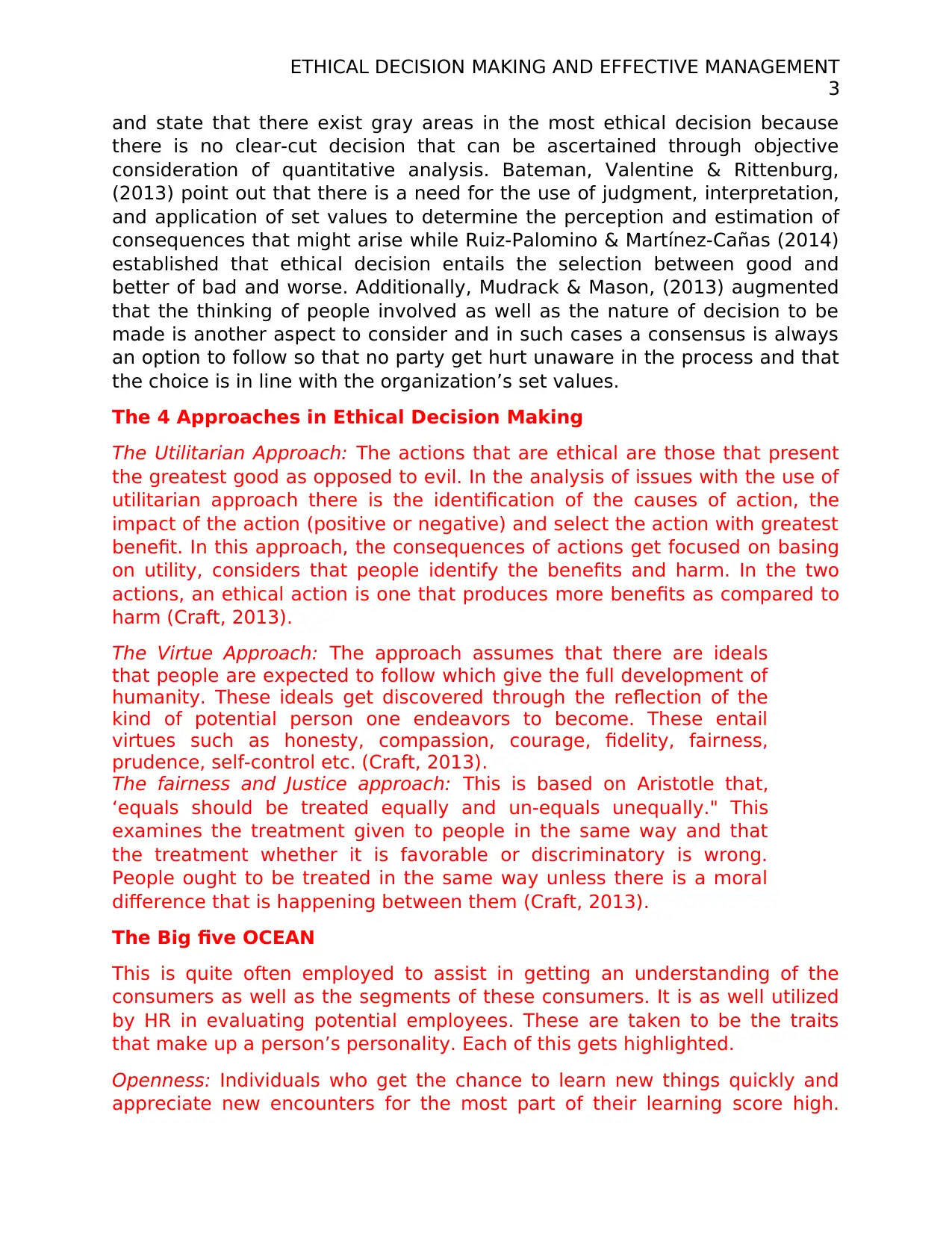
ETHICAL DECISION MAKING AND EFFECTIVE MANAGEMENT
3
and state that there exist gray areas in the most ethical decision because
there is no clear-cut decision that can be ascertained through objective
consideration of quantitative analysis. Bateman, Valentine & Rittenburg,
(2013) point out that there is a need for the use of judgment, interpretation,
and application of set values to determine the perception and estimation of
consequences that might arise while Ruiz-Palomino & Martínez-Cañas (2014)
established that ethical decision entails the selection between good and
better of bad and worse. Additionally, Mudrack & Mason, (2013) augmented
that the thinking of people involved as well as the nature of decision to be
made is another aspect to consider and in such cases a consensus is always
an option to follow so that no party get hurt unaware in the process and that
the choice is in line with the organization’s set values.
The 4 Approaches in Ethical Decision Making
The Utilitarian Approach: The actions that are ethical are those that present
the greatest good as opposed to evil. In the analysis of issues with the use of
utilitarian approach there is the identification of the causes of action, the
impact of the action (positive or negative) and select the action with greatest
benefit. In this approach, the consequences of actions get focused on basing
on utility, considers that people identify the benefits and harm. In the two
actions, an ethical action is one that produces more benefits as compared to
harm (Craft, 2013).
The Virtue Approach: The approach assumes that there are ideals
that people are expected to follow which give the full development of
humanity. These ideals get discovered through the reflection of the
kind of potential person one endeavors to become. These entail
virtues such as honesty, compassion, courage, fidelity, fairness,
prudence, self-control etc. (Craft, 2013).
The fairness and Justice approach: This is based on Aristotle that,
‘equals should be treated equally and un-equals unequally." This
examines the treatment given to people in the same way and that
the treatment whether it is favorable or discriminatory is wrong.
People ought to be treated in the same way unless there is a moral
difference that is happening between them (Craft, 2013).
The Big five OCEAN
This is quite often employed to assist in getting an understanding of the
consumers as well as the segments of these consumers. It is as well utilized
by HR in evaluating potential employees. These are taken to be the traits
that make up a person’s personality. Each of this gets highlighted.
Openness: Individuals who get the chance to learn new things quickly and
appreciate new encounters for the most part of their learning score high.
3
and state that there exist gray areas in the most ethical decision because
there is no clear-cut decision that can be ascertained through objective
consideration of quantitative analysis. Bateman, Valentine & Rittenburg,
(2013) point out that there is a need for the use of judgment, interpretation,
and application of set values to determine the perception and estimation of
consequences that might arise while Ruiz-Palomino & Martínez-Cañas (2014)
established that ethical decision entails the selection between good and
better of bad and worse. Additionally, Mudrack & Mason, (2013) augmented
that the thinking of people involved as well as the nature of decision to be
made is another aspect to consider and in such cases a consensus is always
an option to follow so that no party get hurt unaware in the process and that
the choice is in line with the organization’s set values.
The 4 Approaches in Ethical Decision Making
The Utilitarian Approach: The actions that are ethical are those that present
the greatest good as opposed to evil. In the analysis of issues with the use of
utilitarian approach there is the identification of the causes of action, the
impact of the action (positive or negative) and select the action with greatest
benefit. In this approach, the consequences of actions get focused on basing
on utility, considers that people identify the benefits and harm. In the two
actions, an ethical action is one that produces more benefits as compared to
harm (Craft, 2013).
The Virtue Approach: The approach assumes that there are ideals
that people are expected to follow which give the full development of
humanity. These ideals get discovered through the reflection of the
kind of potential person one endeavors to become. These entail
virtues such as honesty, compassion, courage, fidelity, fairness,
prudence, self-control etc. (Craft, 2013).
The fairness and Justice approach: This is based on Aristotle that,
‘equals should be treated equally and un-equals unequally." This
examines the treatment given to people in the same way and that
the treatment whether it is favorable or discriminatory is wrong.
People ought to be treated in the same way unless there is a moral
difference that is happening between them (Craft, 2013).
The Big five OCEAN
This is quite often employed to assist in getting an understanding of the
consumers as well as the segments of these consumers. It is as well utilized
by HR in evaluating potential employees. These are taken to be the traits
that make up a person’s personality. Each of this gets highlighted.
Openness: Individuals who get the chance to learn new things quickly and
appreciate new encounters for the most part of their learning score high.
⊘ This is a preview!⊘
Do you want full access?
Subscribe today to unlock all pages.

Trusted by 1+ million students worldwide
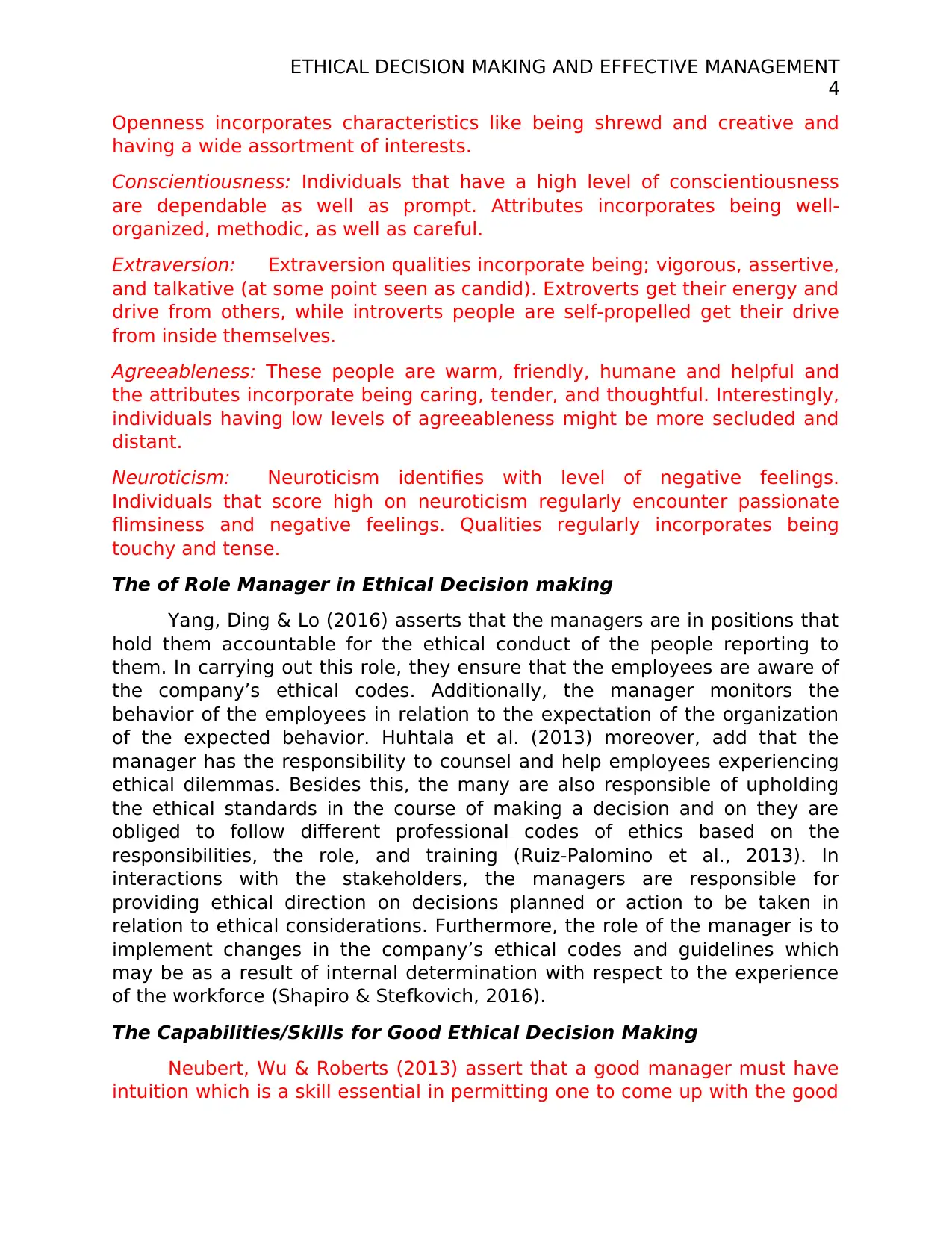
ETHICAL DECISION MAKING AND EFFECTIVE MANAGEMENT
4
Openness incorporates characteristics like being shrewd and creative and
having a wide assortment of interests.
Conscientiousness: Individuals that have a high level of conscientiousness
are dependable as well as prompt. Attributes incorporates being well-
organized, methodic, as well as careful.
Extraversion: Extraversion qualities incorporate being; vigorous, assertive,
and talkative (at some point seen as candid). Extroverts get their energy and
drive from others, while introverts people are self-propelled get their drive
from inside themselves.
Agreeableness: These people are warm, friendly, humane and helpful and
the attributes incorporate being caring, tender, and thoughtful. Interestingly,
individuals having low levels of agreeableness might be more secluded and
distant.
Neuroticism: Neuroticism identifies with level of negative feelings.
Individuals that score high on neuroticism regularly encounter passionate
flimsiness and negative feelings. Qualities regularly incorporates being
touchy and tense.
The of Role Manager in Ethical Decision making
Yang, Ding & Lo (2016) asserts that the managers are in positions that
hold them accountable for the ethical conduct of the people reporting to
them. In carrying out this role, they ensure that the employees are aware of
the company’s ethical codes. Additionally, the manager monitors the
behavior of the employees in relation to the expectation of the organization
of the expected behavior. Huhtala et al. (2013) moreover, add that the
manager has the responsibility to counsel and help employees experiencing
ethical dilemmas. Besides this, the many are also responsible of upholding
the ethical standards in the course of making a decision and on they are
obliged to follow different professional codes of ethics based on the
responsibilities, the role, and training (Ruiz-Palomino et al., 2013). In
interactions with the stakeholders, the managers are responsible for
providing ethical direction on decisions planned or action to be taken in
relation to ethical considerations. Furthermore, the role of the manager is to
implement changes in the company’s ethical codes and guidelines which
may be as a result of internal determination with respect to the experience
of the workforce (Shapiro & Stefkovich, 2016).
The Capabilities/Skills for Good Ethical Decision Making
Neubert, Wu & Roberts (2013) assert that a good manager must have
intuition which is a skill essential in permitting one to come up with the good
4
Openness incorporates characteristics like being shrewd and creative and
having a wide assortment of interests.
Conscientiousness: Individuals that have a high level of conscientiousness
are dependable as well as prompt. Attributes incorporates being well-
organized, methodic, as well as careful.
Extraversion: Extraversion qualities incorporate being; vigorous, assertive,
and talkative (at some point seen as candid). Extroverts get their energy and
drive from others, while introverts people are self-propelled get their drive
from inside themselves.
Agreeableness: These people are warm, friendly, humane and helpful and
the attributes incorporate being caring, tender, and thoughtful. Interestingly,
individuals having low levels of agreeableness might be more secluded and
distant.
Neuroticism: Neuroticism identifies with level of negative feelings.
Individuals that score high on neuroticism regularly encounter passionate
flimsiness and negative feelings. Qualities regularly incorporates being
touchy and tense.
The of Role Manager in Ethical Decision making
Yang, Ding & Lo (2016) asserts that the managers are in positions that
hold them accountable for the ethical conduct of the people reporting to
them. In carrying out this role, they ensure that the employees are aware of
the company’s ethical codes. Additionally, the manager monitors the
behavior of the employees in relation to the expectation of the organization
of the expected behavior. Huhtala et al. (2013) moreover, add that the
manager has the responsibility to counsel and help employees experiencing
ethical dilemmas. Besides this, the many are also responsible of upholding
the ethical standards in the course of making a decision and on they are
obliged to follow different professional codes of ethics based on the
responsibilities, the role, and training (Ruiz-Palomino et al., 2013). In
interactions with the stakeholders, the managers are responsible for
providing ethical direction on decisions planned or action to be taken in
relation to ethical considerations. Furthermore, the role of the manager is to
implement changes in the company’s ethical codes and guidelines which
may be as a result of internal determination with respect to the experience
of the workforce (Shapiro & Stefkovich, 2016).
The Capabilities/Skills for Good Ethical Decision Making
Neubert, Wu & Roberts (2013) assert that a good manager must have
intuition which is a skill essential in permitting one to come up with the good
Paraphrase This Document
Need a fresh take? Get an instant paraphrase of this document with our AI Paraphraser
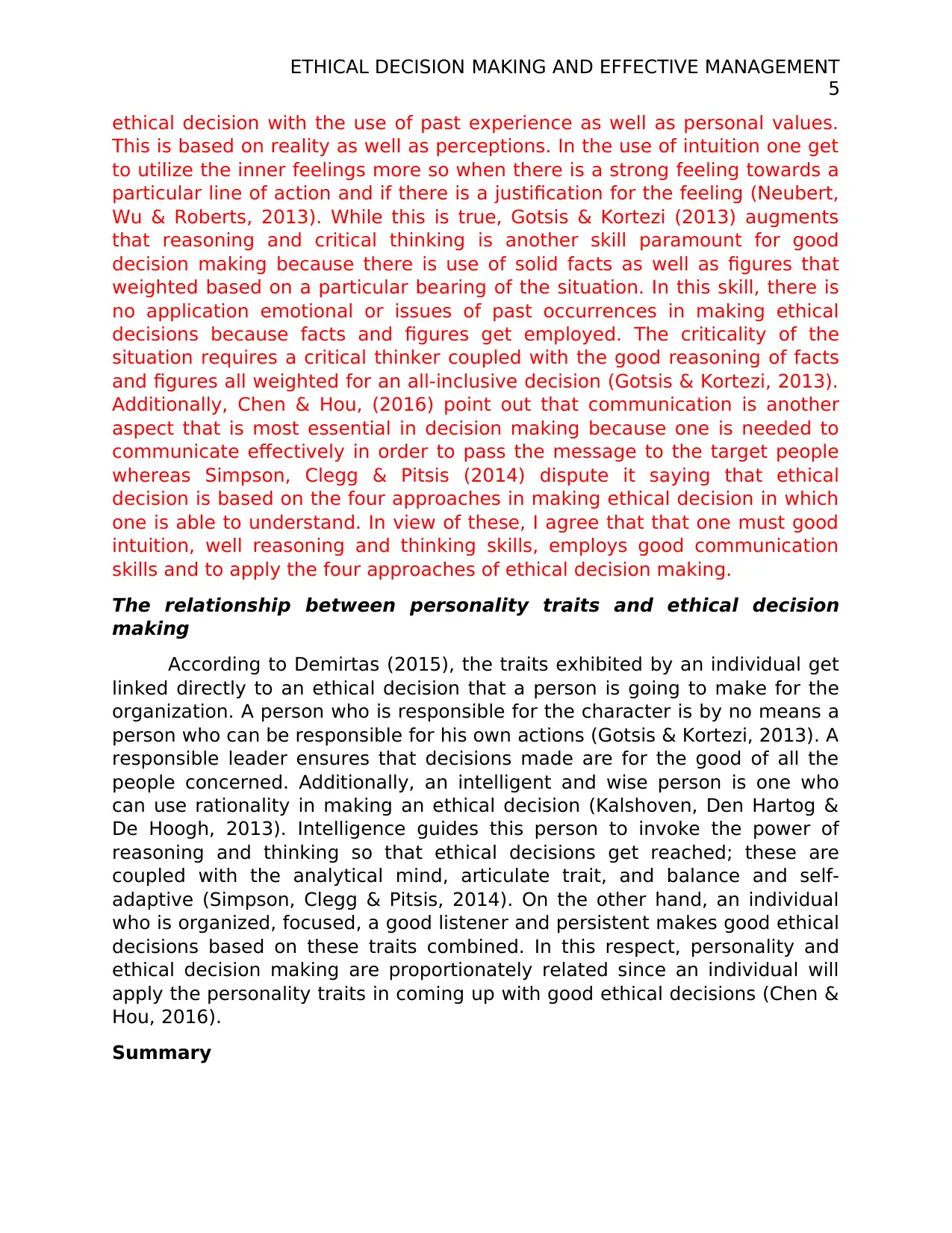
ETHICAL DECISION MAKING AND EFFECTIVE MANAGEMENT
5
ethical decision with the use of past experience as well as personal values.
This is based on reality as well as perceptions. In the use of intuition one get
to utilize the inner feelings more so when there is a strong feeling towards a
particular line of action and if there is a justification for the feeling (Neubert,
Wu & Roberts, 2013). While this is true, Gotsis & Kortezi (2013) augments
that reasoning and critical thinking is another skill paramount for good
decision making because there is use of solid facts as well as figures that
weighted based on a particular bearing of the situation. In this skill, there is
no application emotional or issues of past occurrences in making ethical
decisions because facts and figures get employed. The criticality of the
situation requires a critical thinker coupled with the good reasoning of facts
and figures all weighted for an all-inclusive decision (Gotsis & Kortezi, 2013).
Additionally, Chen & Hou, (2016) point out that communication is another
aspect that is most essential in decision making because one is needed to
communicate effectively in order to pass the message to the target people
whereas Simpson, Clegg & Pitsis (2014) dispute it saying that ethical
decision is based on the four approaches in making ethical decision in which
one is able to understand. In view of these, I agree that that one must good
intuition, well reasoning and thinking skills, employs good communication
skills and to apply the four approaches of ethical decision making.
The relationship between personality traits and ethical decision
making
According to Demirtas (2015), the traits exhibited by an individual get
linked directly to an ethical decision that a person is going to make for the
organization. A person who is responsible for the character is by no means a
person who can be responsible for his own actions (Gotsis & Kortezi, 2013). A
responsible leader ensures that decisions made are for the good of all the
people concerned. Additionally, an intelligent and wise person is one who
can use rationality in making an ethical decision (Kalshoven, Den Hartog &
De Hoogh, 2013). Intelligence guides this person to invoke the power of
reasoning and thinking so that ethical decisions get reached; these are
coupled with the analytical mind, articulate trait, and balance and self-
adaptive (Simpson, Clegg & Pitsis, 2014). On the other hand, an individual
who is organized, focused, a good listener and persistent makes good ethical
decisions based on these traits combined. In this respect, personality and
ethical decision making are proportionately related since an individual will
apply the personality traits in coming up with good ethical decisions (Chen &
Hou, 2016).
Summary
5
ethical decision with the use of past experience as well as personal values.
This is based on reality as well as perceptions. In the use of intuition one get
to utilize the inner feelings more so when there is a strong feeling towards a
particular line of action and if there is a justification for the feeling (Neubert,
Wu & Roberts, 2013). While this is true, Gotsis & Kortezi (2013) augments
that reasoning and critical thinking is another skill paramount for good
decision making because there is use of solid facts as well as figures that
weighted based on a particular bearing of the situation. In this skill, there is
no application emotional or issues of past occurrences in making ethical
decisions because facts and figures get employed. The criticality of the
situation requires a critical thinker coupled with the good reasoning of facts
and figures all weighted for an all-inclusive decision (Gotsis & Kortezi, 2013).
Additionally, Chen & Hou, (2016) point out that communication is another
aspect that is most essential in decision making because one is needed to
communicate effectively in order to pass the message to the target people
whereas Simpson, Clegg & Pitsis (2014) dispute it saying that ethical
decision is based on the four approaches in making ethical decision in which
one is able to understand. In view of these, I agree that that one must good
intuition, well reasoning and thinking skills, employs good communication
skills and to apply the four approaches of ethical decision making.
The relationship between personality traits and ethical decision
making
According to Demirtas (2015), the traits exhibited by an individual get
linked directly to an ethical decision that a person is going to make for the
organization. A person who is responsible for the character is by no means a
person who can be responsible for his own actions (Gotsis & Kortezi, 2013). A
responsible leader ensures that decisions made are for the good of all the
people concerned. Additionally, an intelligent and wise person is one who
can use rationality in making an ethical decision (Kalshoven, Den Hartog &
De Hoogh, 2013). Intelligence guides this person to invoke the power of
reasoning and thinking so that ethical decisions get reached; these are
coupled with the analytical mind, articulate trait, and balance and self-
adaptive (Simpson, Clegg & Pitsis, 2014). On the other hand, an individual
who is organized, focused, a good listener and persistent makes good ethical
decisions based on these traits combined. In this respect, personality and
ethical decision making are proportionately related since an individual will
apply the personality traits in coming up with good ethical decisions (Chen &
Hou, 2016).
Summary
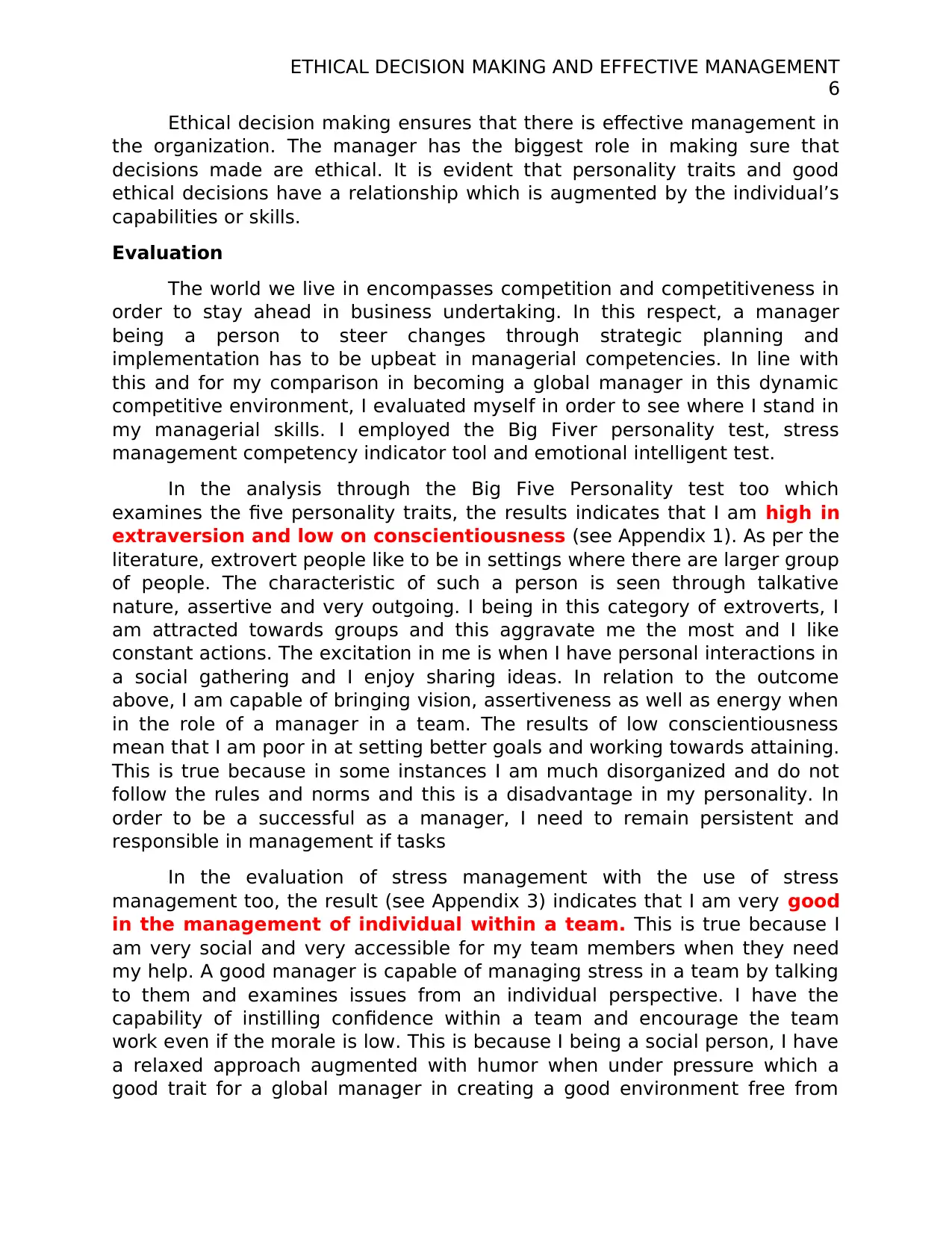
ETHICAL DECISION MAKING AND EFFECTIVE MANAGEMENT
6
Ethical decision making ensures that there is effective management in
the organization. The manager has the biggest role in making sure that
decisions made are ethical. It is evident that personality traits and good
ethical decisions have a relationship which is augmented by the individual’s
capabilities or skills.
Evaluation
The world we live in encompasses competition and competitiveness in
order to stay ahead in business undertaking. In this respect, a manager
being a person to steer changes through strategic planning and
implementation has to be upbeat in managerial competencies. In line with
this and for my comparison in becoming a global manager in this dynamic
competitive environment, I evaluated myself in order to see where I stand in
my managerial skills. I employed the Big Fiver personality test, stress
management competency indicator tool and emotional intelligent test.
In the analysis through the Big Five Personality test too which
examines the five personality traits, the results indicates that I am high in
extraversion and low on conscientiousness (see Appendix 1). As per the
literature, extrovert people like to be in settings where there are larger group
of people. The characteristic of such a person is seen through talkative
nature, assertive and very outgoing. I being in this category of extroverts, I
am attracted towards groups and this aggravate me the most and I like
constant actions. The excitation in me is when I have personal interactions in
a social gathering and I enjoy sharing ideas. In relation to the outcome
above, I am capable of bringing vision, assertiveness as well as energy when
in the role of a manager in a team. The results of low conscientiousness
mean that I am poor in at setting better goals and working towards attaining.
This is true because in some instances I am much disorganized and do not
follow the rules and norms and this is a disadvantage in my personality. In
order to be a successful as a manager, I need to remain persistent and
responsible in management if tasks
In the evaluation of stress management with the use of stress
management too, the result (see Appendix 3) indicates that I am very good
in the management of individual within a team. This is true because I
am very social and very accessible for my team members when they need
my help. A good manager is capable of managing stress in a team by talking
to them and examines issues from an individual perspective. I have the
capability of instilling confidence within a team and encourage the team
work even if the morale is low. This is because I being a social person, I have
a relaxed approach augmented with humor when under pressure which a
good trait for a global manager in creating a good environment free from
6
Ethical decision making ensures that there is effective management in
the organization. The manager has the biggest role in making sure that
decisions made are ethical. It is evident that personality traits and good
ethical decisions have a relationship which is augmented by the individual’s
capabilities or skills.
Evaluation
The world we live in encompasses competition and competitiveness in
order to stay ahead in business undertaking. In this respect, a manager
being a person to steer changes through strategic planning and
implementation has to be upbeat in managerial competencies. In line with
this and for my comparison in becoming a global manager in this dynamic
competitive environment, I evaluated myself in order to see where I stand in
my managerial skills. I employed the Big Fiver personality test, stress
management competency indicator tool and emotional intelligent test.
In the analysis through the Big Five Personality test too which
examines the five personality traits, the results indicates that I am high in
extraversion and low on conscientiousness (see Appendix 1). As per the
literature, extrovert people like to be in settings where there are larger group
of people. The characteristic of such a person is seen through talkative
nature, assertive and very outgoing. I being in this category of extroverts, I
am attracted towards groups and this aggravate me the most and I like
constant actions. The excitation in me is when I have personal interactions in
a social gathering and I enjoy sharing ideas. In relation to the outcome
above, I am capable of bringing vision, assertiveness as well as energy when
in the role of a manager in a team. The results of low conscientiousness
mean that I am poor in at setting better goals and working towards attaining.
This is true because in some instances I am much disorganized and do not
follow the rules and norms and this is a disadvantage in my personality. In
order to be a successful as a manager, I need to remain persistent and
responsible in management if tasks
In the evaluation of stress management with the use of stress
management too, the result (see Appendix 3) indicates that I am very good
in the management of individual within a team. This is true because I
am very social and very accessible for my team members when they need
my help. A good manager is capable of managing stress in a team by talking
to them and examines issues from an individual perspective. I have the
capability of instilling confidence within a team and encourage the team
work even if the morale is low. This is because I being a social person, I have
a relaxed approach augmented with humor when under pressure which a
good trait for a global manager in creating a good environment free from
⊘ This is a preview!⊘
Do you want full access?
Subscribe today to unlock all pages.

Trusted by 1+ million students worldwide
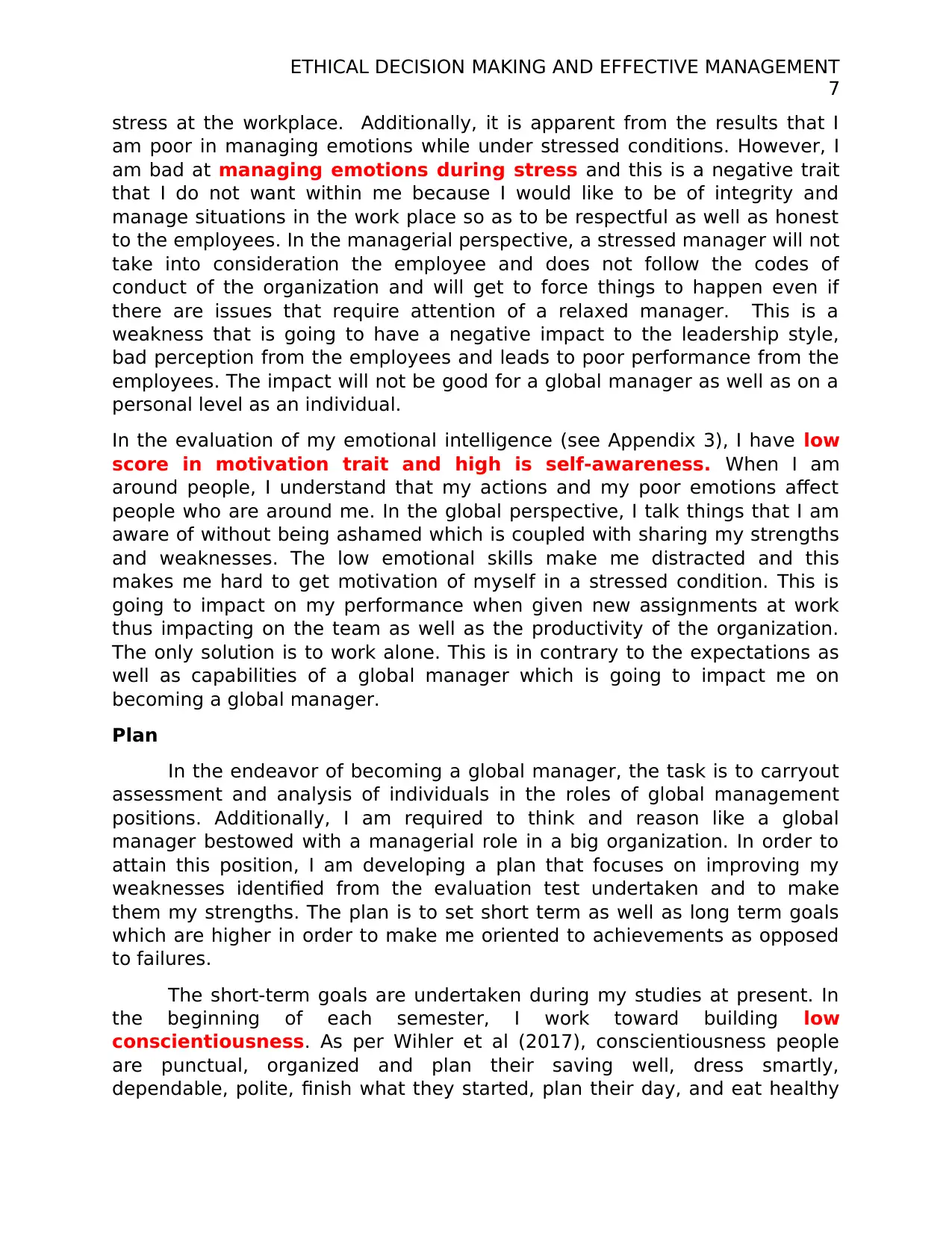
ETHICAL DECISION MAKING AND EFFECTIVE MANAGEMENT
7
stress at the workplace. Additionally, it is apparent from the results that I
am poor in managing emotions while under stressed conditions. However, I
am bad at managing emotions during stress and this is a negative trait
that I do not want within me because I would like to be of integrity and
manage situations in the work place so as to be respectful as well as honest
to the employees. In the managerial perspective, a stressed manager will not
take into consideration the employee and does not follow the codes of
conduct of the organization and will get to force things to happen even if
there are issues that require attention of a relaxed manager. This is a
weakness that is going to have a negative impact to the leadership style,
bad perception from the employees and leads to poor performance from the
employees. The impact will not be good for a global manager as well as on a
personal level as an individual.
In the evaluation of my emotional intelligence (see Appendix 3), I have low
score in motivation trait and high is self-awareness. When I am
around people, I understand that my actions and my poor emotions affect
people who are around me. In the global perspective, I talk things that I am
aware of without being ashamed which is coupled with sharing my strengths
and weaknesses. The low emotional skills make me distracted and this
makes me hard to get motivation of myself in a stressed condition. This is
going to impact on my performance when given new assignments at work
thus impacting on the team as well as the productivity of the organization.
The only solution is to work alone. This is in contrary to the expectations as
well as capabilities of a global manager which is going to impact me on
becoming a global manager.
Plan
In the endeavor of becoming a global manager, the task is to carryout
assessment and analysis of individuals in the roles of global management
positions. Additionally, I am required to think and reason like a global
manager bestowed with a managerial role in a big organization. In order to
attain this position, I am developing a plan that focuses on improving my
weaknesses identified from the evaluation test undertaken and to make
them my strengths. The plan is to set short term as well as long term goals
which are higher in order to make me oriented to achievements as opposed
to failures.
The short-term goals are undertaken during my studies at present. In
the beginning of each semester, I work toward building low
conscientiousness. As per Wihler et al (2017), conscientiousness people
are punctual, organized and plan their saving well, dress smartly,
dependable, polite, finish what they started, plan their day, and eat healthy
7
stress at the workplace. Additionally, it is apparent from the results that I
am poor in managing emotions while under stressed conditions. However, I
am bad at managing emotions during stress and this is a negative trait
that I do not want within me because I would like to be of integrity and
manage situations in the work place so as to be respectful as well as honest
to the employees. In the managerial perspective, a stressed manager will not
take into consideration the employee and does not follow the codes of
conduct of the organization and will get to force things to happen even if
there are issues that require attention of a relaxed manager. This is a
weakness that is going to have a negative impact to the leadership style,
bad perception from the employees and leads to poor performance from the
employees. The impact will not be good for a global manager as well as on a
personal level as an individual.
In the evaluation of my emotional intelligence (see Appendix 3), I have low
score in motivation trait and high is self-awareness. When I am
around people, I understand that my actions and my poor emotions affect
people who are around me. In the global perspective, I talk things that I am
aware of without being ashamed which is coupled with sharing my strengths
and weaknesses. The low emotional skills make me distracted and this
makes me hard to get motivation of myself in a stressed condition. This is
going to impact on my performance when given new assignments at work
thus impacting on the team as well as the productivity of the organization.
The only solution is to work alone. This is in contrary to the expectations as
well as capabilities of a global manager which is going to impact me on
becoming a global manager.
Plan
In the endeavor of becoming a global manager, the task is to carryout
assessment and analysis of individuals in the roles of global management
positions. Additionally, I am required to think and reason like a global
manager bestowed with a managerial role in a big organization. In order to
attain this position, I am developing a plan that focuses on improving my
weaknesses identified from the evaluation test undertaken and to make
them my strengths. The plan is to set short term as well as long term goals
which are higher in order to make me oriented to achievements as opposed
to failures.
The short-term goals are undertaken during my studies at present. In
the beginning of each semester, I work toward building low
conscientiousness. As per Wihler et al (2017), conscientiousness people
are punctual, organized and plan their saving well, dress smartly,
dependable, polite, finish what they started, plan their day, and eat healthy
Paraphrase This Document
Need a fresh take? Get an instant paraphrase of this document with our AI Paraphraser
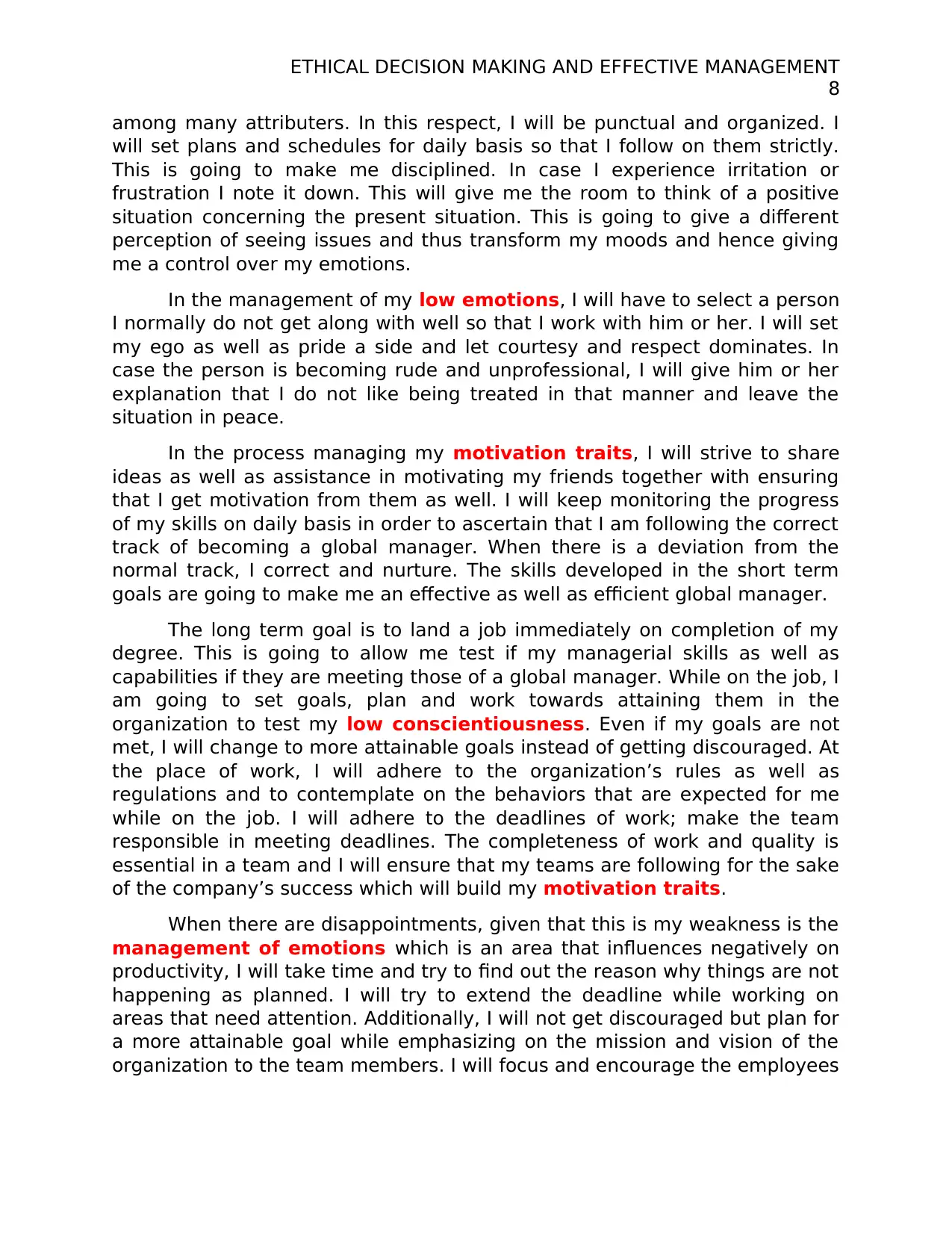
ETHICAL DECISION MAKING AND EFFECTIVE MANAGEMENT
8
among many attributers. In this respect, I will be punctual and organized. I
will set plans and schedules for daily basis so that I follow on them strictly.
This is going to make me disciplined. In case I experience irritation or
frustration I note it down. This will give me the room to think of a positive
situation concerning the present situation. This is going to give a different
perception of seeing issues and thus transform my moods and hence giving
me a control over my emotions.
In the management of my low emotions, I will have to select a person
I normally do not get along with well so that I work with him or her. I will set
my ego as well as pride a side and let courtesy and respect dominates. In
case the person is becoming rude and unprofessional, I will give him or her
explanation that I do not like being treated in that manner and leave the
situation in peace.
In the process managing my motivation traits, I will strive to share
ideas as well as assistance in motivating my friends together with ensuring
that I get motivation from them as well. I will keep monitoring the progress
of my skills on daily basis in order to ascertain that I am following the correct
track of becoming a global manager. When there is a deviation from the
normal track, I correct and nurture. The skills developed in the short term
goals are going to make me an effective as well as efficient global manager.
The long term goal is to land a job immediately on completion of my
degree. This is going to allow me test if my managerial skills as well as
capabilities if they are meeting those of a global manager. While on the job, I
am going to set goals, plan and work towards attaining them in the
organization to test my low conscientiousness. Even if my goals are not
met, I will change to more attainable goals instead of getting discouraged. At
the place of work, I will adhere to the organization’s rules as well as
regulations and to contemplate on the behaviors that are expected for me
while on the job. I will adhere to the deadlines of work; make the team
responsible in meeting deadlines. The completeness of work and quality is
essential in a team and I will ensure that my teams are following for the sake
of the company’s success which will build my motivation traits.
When there are disappointments, given that this is my weakness is the
management of emotions which is an area that influences negatively on
productivity, I will take time and try to find out the reason why things are not
happening as planned. I will try to extend the deadline while working on
areas that need attention. Additionally, I will not get discouraged but plan for
a more attainable goal while emphasizing on the mission and vision of the
organization to the team members. I will focus and encourage the employees
8
among many attributers. In this respect, I will be punctual and organized. I
will set plans and schedules for daily basis so that I follow on them strictly.
This is going to make me disciplined. In case I experience irritation or
frustration I note it down. This will give me the room to think of a positive
situation concerning the present situation. This is going to give a different
perception of seeing issues and thus transform my moods and hence giving
me a control over my emotions.
In the management of my low emotions, I will have to select a person
I normally do not get along with well so that I work with him or her. I will set
my ego as well as pride a side and let courtesy and respect dominates. In
case the person is becoming rude and unprofessional, I will give him or her
explanation that I do not like being treated in that manner and leave the
situation in peace.
In the process managing my motivation traits, I will strive to share
ideas as well as assistance in motivating my friends together with ensuring
that I get motivation from them as well. I will keep monitoring the progress
of my skills on daily basis in order to ascertain that I am following the correct
track of becoming a global manager. When there is a deviation from the
normal track, I correct and nurture. The skills developed in the short term
goals are going to make me an effective as well as efficient global manager.
The long term goal is to land a job immediately on completion of my
degree. This is going to allow me test if my managerial skills as well as
capabilities if they are meeting those of a global manager. While on the job, I
am going to set goals, plan and work towards attaining them in the
organization to test my low conscientiousness. Even if my goals are not
met, I will change to more attainable goals instead of getting discouraged. At
the place of work, I will adhere to the organization’s rules as well as
regulations and to contemplate on the behaviors that are expected for me
while on the job. I will adhere to the deadlines of work; make the team
responsible in meeting deadlines. The completeness of work and quality is
essential in a team and I will ensure that my teams are following for the sake
of the company’s success which will build my motivation traits.
When there are disappointments, given that this is my weakness is the
management of emotions which is an area that influences negatively on
productivity, I will take time and try to find out the reason why things are not
happening as planned. I will try to extend the deadline while working on
areas that need attention. Additionally, I will not get discouraged but plan for
a more attainable goal while emphasizing on the mission and vision of the
organization to the team members. I will focus and encourage the employees
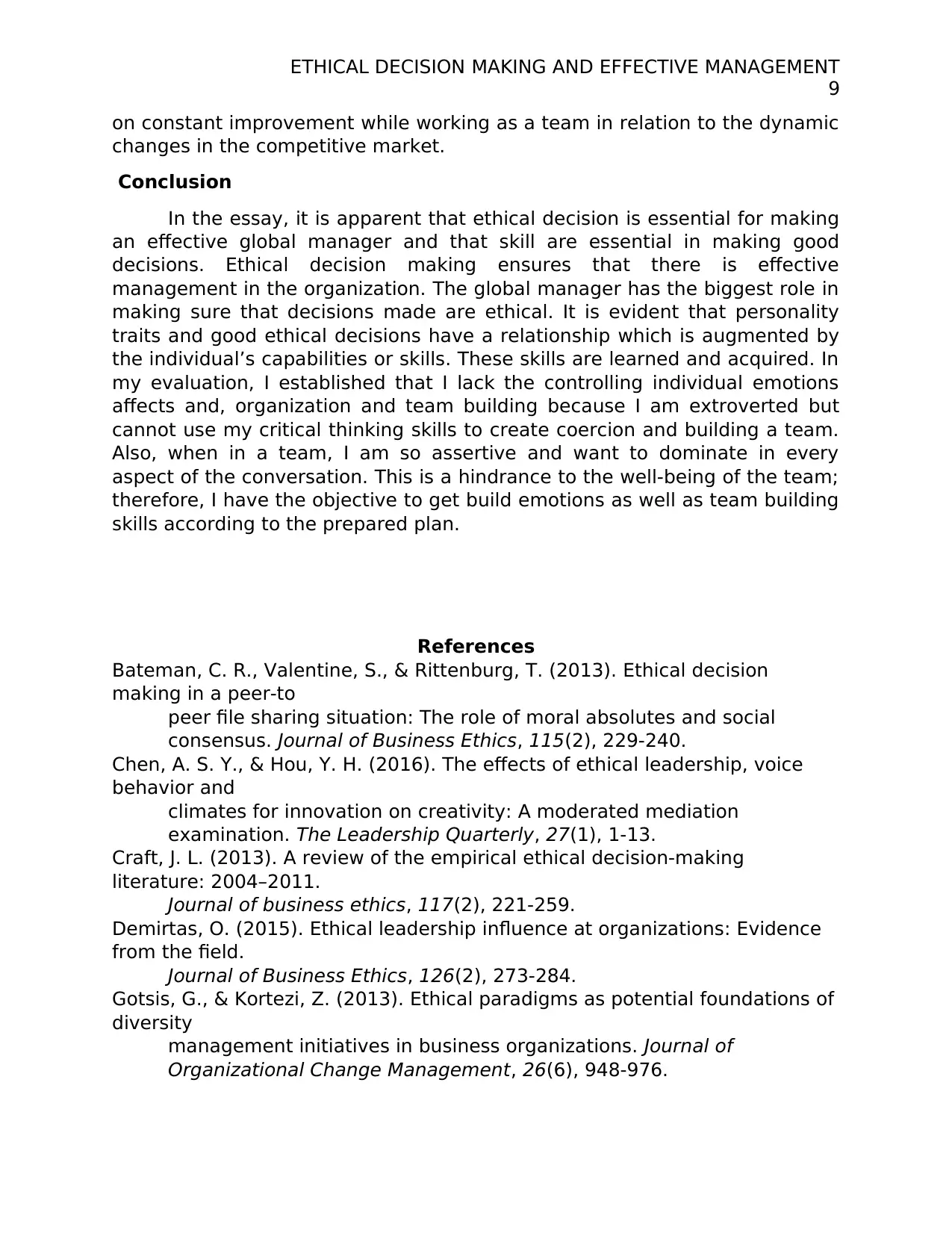
ETHICAL DECISION MAKING AND EFFECTIVE MANAGEMENT
9
on constant improvement while working as a team in relation to the dynamic
changes in the competitive market.
Conclusion
In the essay, it is apparent that ethical decision is essential for making
an effective global manager and that skill are essential in making good
decisions. Ethical decision making ensures that there is effective
management in the organization. The global manager has the biggest role in
making sure that decisions made are ethical. It is evident that personality
traits and good ethical decisions have a relationship which is augmented by
the individual’s capabilities or skills. These skills are learned and acquired. In
my evaluation, I established that I lack the controlling individual emotions
affects and, organization and team building because I am extroverted but
cannot use my critical thinking skills to create coercion and building a team.
Also, when in a team, I am so assertive and want to dominate in every
aspect of the conversation. This is a hindrance to the well-being of the team;
therefore, I have the objective to get build emotions as well as team building
skills according to the prepared plan.
References
Bateman, C. R., Valentine, S., & Rittenburg, T. (2013). Ethical decision
making in a peer-to
peer file sharing situation: The role of moral absolutes and social
consensus. Journal of Business Ethics, 115(2), 229-240.
Chen, A. S. Y., & Hou, Y. H. (2016). The effects of ethical leadership, voice
behavior and
climates for innovation on creativity: A moderated mediation
examination. The Leadership Quarterly, 27(1), 1-13.
Craft, J. L. (2013). A review of the empirical ethical decision-making
literature: 2004–2011.
Journal of business ethics, 117(2), 221-259.
Demirtas, O. (2015). Ethical leadership influence at organizations: Evidence
from the field.
Journal of Business Ethics, 126(2), 273-284.
Gotsis, G., & Kortezi, Z. (2013). Ethical paradigms as potential foundations of
diversity
management initiatives in business organizations. Journal of
Organizational Change Management, 26(6), 948-976.
9
on constant improvement while working as a team in relation to the dynamic
changes in the competitive market.
Conclusion
In the essay, it is apparent that ethical decision is essential for making
an effective global manager and that skill are essential in making good
decisions. Ethical decision making ensures that there is effective
management in the organization. The global manager has the biggest role in
making sure that decisions made are ethical. It is evident that personality
traits and good ethical decisions have a relationship which is augmented by
the individual’s capabilities or skills. These skills are learned and acquired. In
my evaluation, I established that I lack the controlling individual emotions
affects and, organization and team building because I am extroverted but
cannot use my critical thinking skills to create coercion and building a team.
Also, when in a team, I am so assertive and want to dominate in every
aspect of the conversation. This is a hindrance to the well-being of the team;
therefore, I have the objective to get build emotions as well as team building
skills according to the prepared plan.
References
Bateman, C. R., Valentine, S., & Rittenburg, T. (2013). Ethical decision
making in a peer-to
peer file sharing situation: The role of moral absolutes and social
consensus. Journal of Business Ethics, 115(2), 229-240.
Chen, A. S. Y., & Hou, Y. H. (2016). The effects of ethical leadership, voice
behavior and
climates for innovation on creativity: A moderated mediation
examination. The Leadership Quarterly, 27(1), 1-13.
Craft, J. L. (2013). A review of the empirical ethical decision-making
literature: 2004–2011.
Journal of business ethics, 117(2), 221-259.
Demirtas, O. (2015). Ethical leadership influence at organizations: Evidence
from the field.
Journal of Business Ethics, 126(2), 273-284.
Gotsis, G., & Kortezi, Z. (2013). Ethical paradigms as potential foundations of
diversity
management initiatives in business organizations. Journal of
Organizational Change Management, 26(6), 948-976.
⊘ This is a preview!⊘
Do you want full access?
Subscribe today to unlock all pages.

Trusted by 1+ million students worldwide
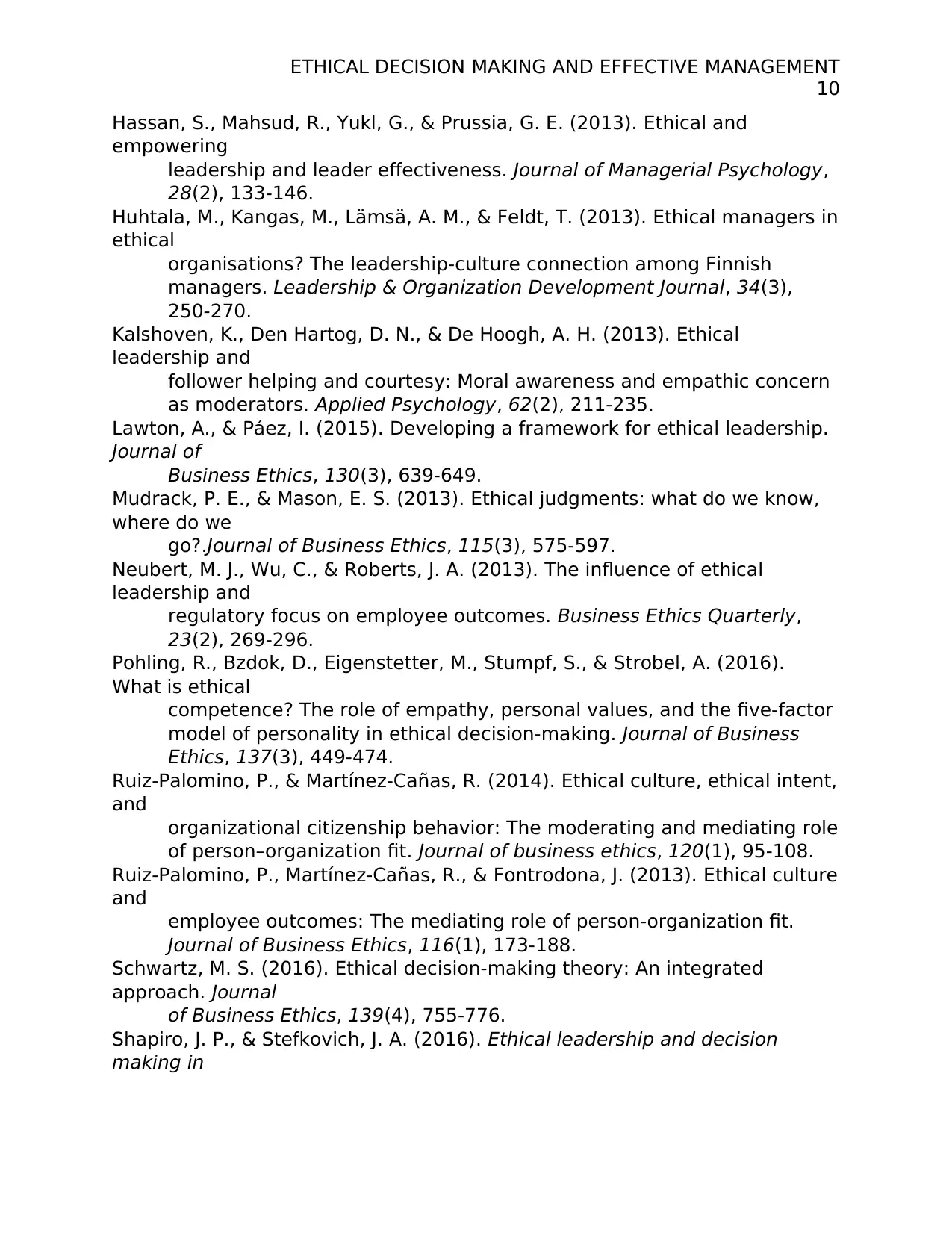
ETHICAL DECISION MAKING AND EFFECTIVE MANAGEMENT
10
Hassan, S., Mahsud, R., Yukl, G., & Prussia, G. E. (2013). Ethical and
empowering
leadership and leader effectiveness. Journal of Managerial Psychology,
28(2), 133-146.
Huhtala, M., Kangas, M., Lämsä, A. M., & Feldt, T. (2013). Ethical managers in
ethical
organisations? The leadership-culture connection among Finnish
managers. Leadership & Organization Development Journal, 34(3),
250-270.
Kalshoven, K., Den Hartog, D. N., & De Hoogh, A. H. (2013). Ethical
leadership and
follower helping and courtesy: Moral awareness and empathic concern
as moderators. Applied Psychology, 62(2), 211-235.
Lawton, A., & Páez, I. (2015). Developing a framework for ethical leadership.
Journal of
Business Ethics, 130(3), 639-649.
Mudrack, P. E., & Mason, E. S. (2013). Ethical judgments: what do we know,
where do we
go?.Journal of Business Ethics, 115(3), 575-597.
Neubert, M. J., Wu, C., & Roberts, J. A. (2013). The influence of ethical
leadership and
regulatory focus on employee outcomes. Business Ethics Quarterly,
23(2), 269-296.
Pohling, R., Bzdok, D., Eigenstetter, M., Stumpf, S., & Strobel, A. (2016).
What is ethical
competence? The role of empathy, personal values, and the five-factor
model of personality in ethical decision-making. Journal of Business
Ethics, 137(3), 449-474.
Ruiz-Palomino, P., & Martínez-Cañas, R. (2014). Ethical culture, ethical intent,
and
organizational citizenship behavior: The moderating and mediating role
of person–organization fit. Journal of business ethics, 120(1), 95-108.
Ruiz-Palomino, P., Martínez-Cañas, R., & Fontrodona, J. (2013). Ethical culture
and
employee outcomes: The mediating role of person-organization fit.
Journal of Business Ethics, 116(1), 173-188.
Schwartz, M. S. (2016). Ethical decision-making theory: An integrated
approach. Journal
of Business Ethics, 139(4), 755-776.
Shapiro, J. P., & Stefkovich, J. A. (2016). Ethical leadership and decision
making in
10
Hassan, S., Mahsud, R., Yukl, G., & Prussia, G. E. (2013). Ethical and
empowering
leadership and leader effectiveness. Journal of Managerial Psychology,
28(2), 133-146.
Huhtala, M., Kangas, M., Lämsä, A. M., & Feldt, T. (2013). Ethical managers in
ethical
organisations? The leadership-culture connection among Finnish
managers. Leadership & Organization Development Journal, 34(3),
250-270.
Kalshoven, K., Den Hartog, D. N., & De Hoogh, A. H. (2013). Ethical
leadership and
follower helping and courtesy: Moral awareness and empathic concern
as moderators. Applied Psychology, 62(2), 211-235.
Lawton, A., & Páez, I. (2015). Developing a framework for ethical leadership.
Journal of
Business Ethics, 130(3), 639-649.
Mudrack, P. E., & Mason, E. S. (2013). Ethical judgments: what do we know,
where do we
go?.Journal of Business Ethics, 115(3), 575-597.
Neubert, M. J., Wu, C., & Roberts, J. A. (2013). The influence of ethical
leadership and
regulatory focus on employee outcomes. Business Ethics Quarterly,
23(2), 269-296.
Pohling, R., Bzdok, D., Eigenstetter, M., Stumpf, S., & Strobel, A. (2016).
What is ethical
competence? The role of empathy, personal values, and the five-factor
model of personality in ethical decision-making. Journal of Business
Ethics, 137(3), 449-474.
Ruiz-Palomino, P., & Martínez-Cañas, R. (2014). Ethical culture, ethical intent,
and
organizational citizenship behavior: The moderating and mediating role
of person–organization fit. Journal of business ethics, 120(1), 95-108.
Ruiz-Palomino, P., Martínez-Cañas, R., & Fontrodona, J. (2013). Ethical culture
and
employee outcomes: The mediating role of person-organization fit.
Journal of Business Ethics, 116(1), 173-188.
Schwartz, M. S. (2016). Ethical decision-making theory: An integrated
approach. Journal
of Business Ethics, 139(4), 755-776.
Shapiro, J. P., & Stefkovich, J. A. (2016). Ethical leadership and decision
making in
Paraphrase This Document
Need a fresh take? Get an instant paraphrase of this document with our AI Paraphraser
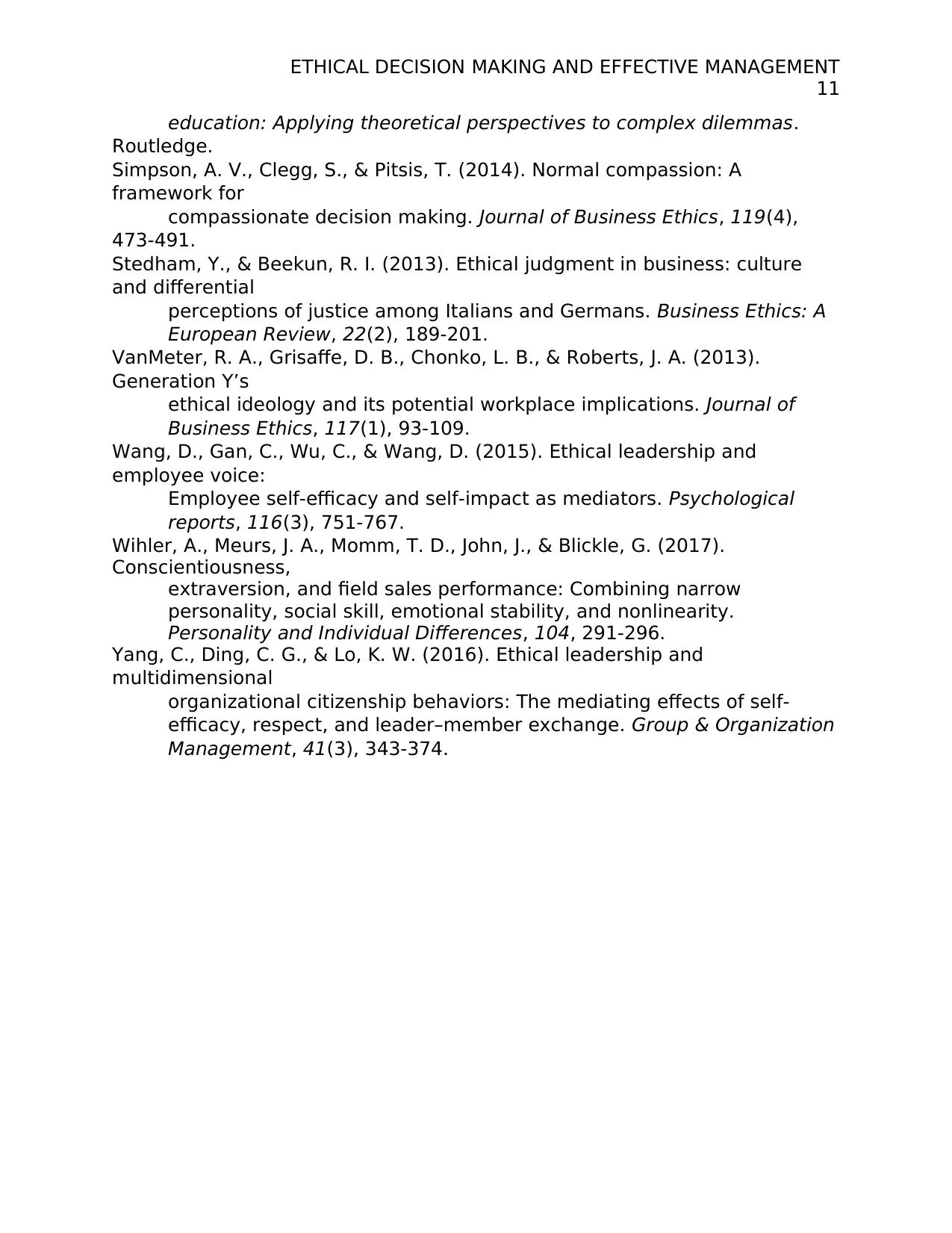
ETHICAL DECISION MAKING AND EFFECTIVE MANAGEMENT
11
education: Applying theoretical perspectives to complex dilemmas.
Routledge.
Simpson, A. V., Clegg, S., & Pitsis, T. (2014). Normal compassion: A
framework for
compassionate decision making. Journal of Business Ethics, 119(4),
473-491.
Stedham, Y., & Beekun, R. I. (2013). Ethical judgment in business: culture
and differential
perceptions of justice among Italians and Germans. Business Ethics: A
European Review, 22(2), 189-201.
VanMeter, R. A., Grisaffe, D. B., Chonko, L. B., & Roberts, J. A. (2013).
Generation Y’s
ethical ideology and its potential workplace implications. Journal of
Business Ethics, 117(1), 93-109.
Wang, D., Gan, C., Wu, C., & Wang, D. (2015). Ethical leadership and
employee voice:
Employee self-efficacy and self-impact as mediators. Psychological
reports, 116(3), 751-767.
Wihler, A., Meurs, J. A., Momm, T. D., John, J., & Blickle, G. (2017).
Conscientiousness,
extraversion, and field sales performance: Combining narrow
personality, social skill, emotional stability, and nonlinearity.
Personality and Individual Differences, 104, 291-296.
Yang, C., Ding, C. G., & Lo, K. W. (2016). Ethical leadership and
multidimensional
organizational citizenship behaviors: The mediating effects of self-
efficacy, respect, and leader–member exchange. Group & Organization
Management, 41(3), 343-374.
11
education: Applying theoretical perspectives to complex dilemmas.
Routledge.
Simpson, A. V., Clegg, S., & Pitsis, T. (2014). Normal compassion: A
framework for
compassionate decision making. Journal of Business Ethics, 119(4),
473-491.
Stedham, Y., & Beekun, R. I. (2013). Ethical judgment in business: culture
and differential
perceptions of justice among Italians and Germans. Business Ethics: A
European Review, 22(2), 189-201.
VanMeter, R. A., Grisaffe, D. B., Chonko, L. B., & Roberts, J. A. (2013).
Generation Y’s
ethical ideology and its potential workplace implications. Journal of
Business Ethics, 117(1), 93-109.
Wang, D., Gan, C., Wu, C., & Wang, D. (2015). Ethical leadership and
employee voice:
Employee self-efficacy and self-impact as mediators. Psychological
reports, 116(3), 751-767.
Wihler, A., Meurs, J. A., Momm, T. D., John, J., & Blickle, G. (2017).
Conscientiousness,
extraversion, and field sales performance: Combining narrow
personality, social skill, emotional stability, and nonlinearity.
Personality and Individual Differences, 104, 291-296.
Yang, C., Ding, C. G., & Lo, K. W. (2016). Ethical leadership and
multidimensional
organizational citizenship behaviors: The mediating effects of self-
efficacy, respect, and leader–member exchange. Group & Organization
Management, 41(3), 343-374.
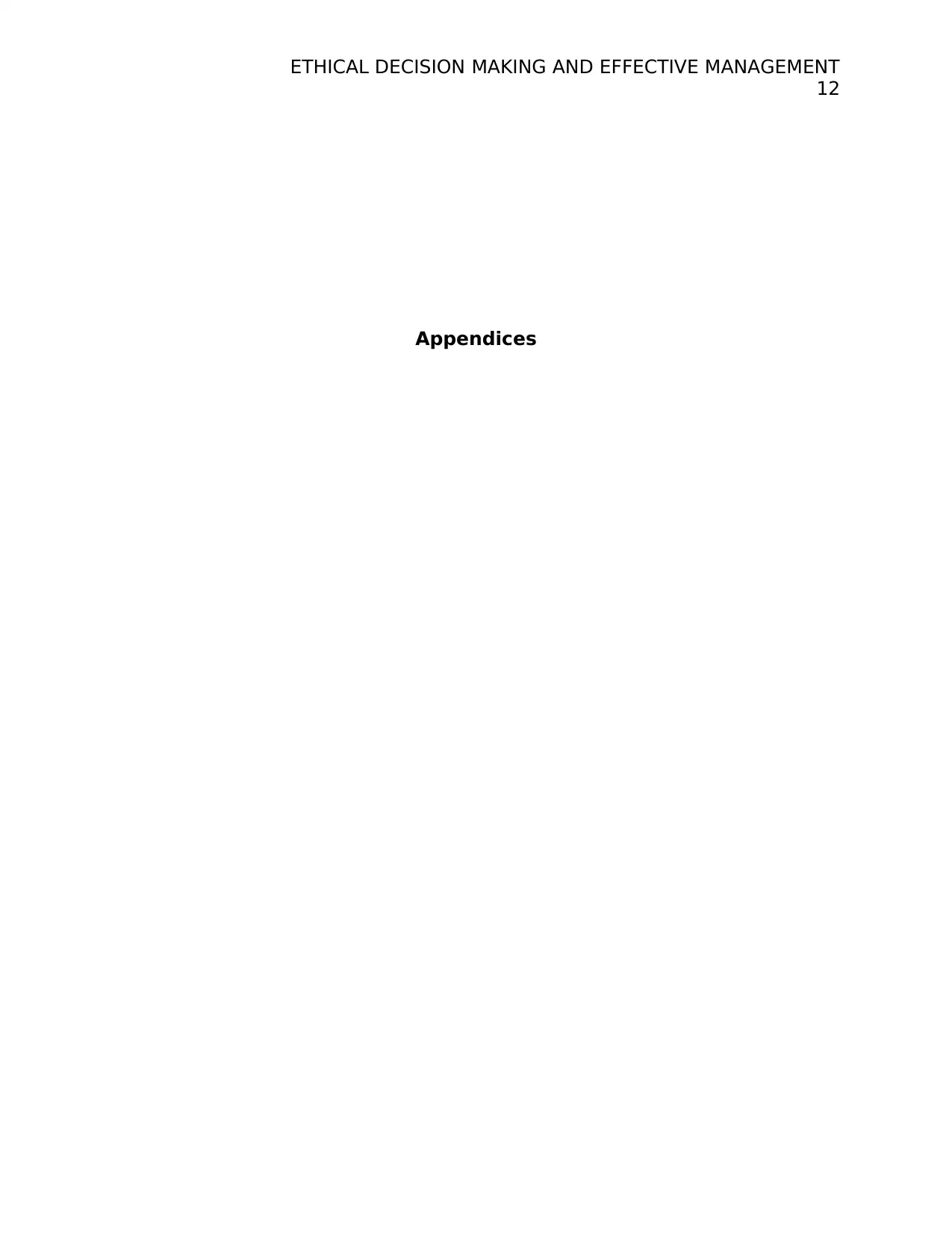
ETHICAL DECISION MAKING AND EFFECTIVE MANAGEMENT
12
Appendices
12
Appendices
⊘ This is a preview!⊘
Do you want full access?
Subscribe today to unlock all pages.

Trusted by 1+ million students worldwide
1 out of 14
Related Documents
Your All-in-One AI-Powered Toolkit for Academic Success.
+13062052269
info@desklib.com
Available 24*7 on WhatsApp / Email
![[object Object]](/_next/static/media/star-bottom.7253800d.svg)
Unlock your academic potential
Copyright © 2020–2026 A2Z Services. All Rights Reserved. Developed and managed by ZUCOL.





